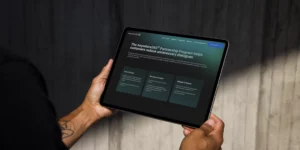Accelerating software delivery with DASA DevOps principles
The challenge
A rapidly growing SaaS and freelance employee marketplace provider operating in highly regulated sectors like childcare and healthcare faced challenges in its software development and product management. Their hybrid team structure, comprising internal, external, and third-party members, led to several pain points:
- Extended release cycles: software releases often stretched over months, hindering time-to-market for new features.
- Frequent production issues: recurring problems and downtime impacted system reliability and user experience.
- Siloed teams: a disconnect between development and operations teams resulted in poor communication and collaboration.
- Slow customer feedback response: inability to quickly adapt to customer feedback and market demands.
The client sought a partner to bridge these gaps and implement a more efficient, reliable, and rapid software delivery process.

Our solution
WeAreBrain collaborated closely with the client to initiate a comprehensive DevOps transformation, adhering strictly to DASA’s best practices. Our approach focused on fostering a culture of continuous improvement, automation, and cross-functional collaboration:
- Customer-centric actions: we initiated feedback sessions and established a customer advisory board to prioritize features based on customer value, aligning development efforts with end-user needs.
- Outcome-driven development: we shifted focus from feature releases to product releases with clear business outcomes, such as revenue growth and the launch of new verticals.
- End-to-end ownership: we helped restructure teams to be product- and outcome-oriented, empowering them with responsibility for the entire product lifecycle, from development to maintenance. This fostered a hybrid team model with expertise from the client, WeAreBrain, and third parties.
- Cross-functional autonomous teams: we formed multi-functional teams (developers, QA, operations, business) with the autonomy to make decisions, improving collaboration and reducing delays.
- Continuous improvement loop: we implemented agile methodologies and regular retrospectives, coupled with ongoing training, to foster a culture of learning and adaptability.
- Automate everything possible: we guided the implementation of automation tools for Continuous Integration/Continuous Deployment (CI/CD), testing, and monitoring, significantly reducing manual effort and improving release consistency.
Our active involvement in advising and assisting with the rollout and implementation of these DevOps best practices ensured a smooth and effective transformation.
The result
Thanks to our implementation of DASA DevOps principles over 1.5 years of ongoing collaboration, the hybrid teams now consistently apply DevOps best practices in their daily routines. The tangible results include:
Business operations:
- Faster rollout of two new verticals in healthcare and education.
- Achieved GDPR compliance.
Technology and efficiency:
- Reduced infrastructure costs by 10%.
- Increased team velocity by over 40%.
- Release cycles shortened from months to weeks, enabling faster delivery of new features.
- 25% reduction in production issues due to improved testing and continuous monitoring, leading to a more stable and higher-quality platform.
Customer & employee satisfaction:
- Improved customer satisfaction scores through frequent updates and better alignment of product features with customer needs.
- Higher employee engagement and job satisfaction within DevOps teams, attributed to increased autonomy, ownership, and learning opportunities.
Our active involvement in advising and assisting with the rollout ensured a smooth and effective transformation that positioned the client as a leader in their regulated industry sectors.
Technology used
- Github Copilot
- DASA DevOps methodology implementation
- CI/CD automation tools
- Continuous monitoring and testing frameworks
- Agile development practices




